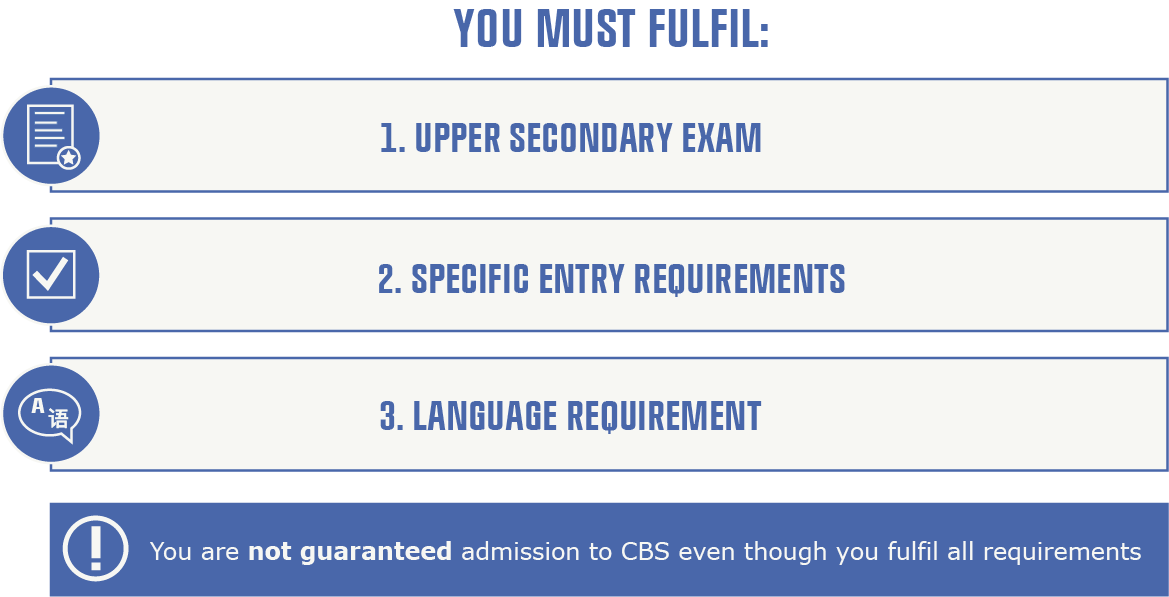Entry requirements
1. General entry requirement
When applying for CBS bachelor programmes, you must document that you have completed a qualifying Danish upper secondary exam or one of its international equivalents. This is the general entry requirement for admission.
Choose the relevant category below to find out how you can determine if your upper secondary exam fulfils the general entry requirement, and what you can do if this is not the case.
2. THE SPECIFIC ENTRY REQUIREMENTS
Each CBS bachelor programme has its own set of specific entry requirements, consisting of specific subjects, passed at a certain Danish upper secondary level. The subjects must be completed with the minimum passing grade (2.0 on the Danish grading scale), unless a higher Danish grade requirement is specified.
You are not considered qualified for the respective programme unless you fulfil all its specific entry requirements, and it is your responsiblity to document that you have met the requirements exactly as indicated in the table below. If you have a non-Danish upper secondary exam, please consult the overview "How to fulfil the specific entry requirements" further down on this page for further details.
Don't forget that English-taught programmes have an additional language requirement (English at Danish upper secondary level A), which you must fulfil exactly as indicated in Section 3 - "The language requirement", at the bottom of this page.
Danish-taught programmes require a high level of proficiency in Danish (Danish at upper secondary level A). If you have an international educational background, make sure you have the required qualifications before you apply for one of them.
HOW TO FULFIL THE SPECIFIC ENTRY REQUIREMENTS
The specific entry requirements can only be fulfilled via:
- Danish upper secondary qualifications or their international equivalents (see International applicants for a list of the most common types of international qualifications) or
- Supplementary upper secondary courses, available in Denmark as GSK or HF bridging subjects or
- Other documented study activities that CBS Admissions has concretely assessed as fulfilling the specific entry requirements.
Please note that, if you take supplementary courses in order to fulfil a specific entry requirement, this might lead to a recalculation of your grade point average (GPA) in the selection process.
Required grade
If a specific grade is required, then you must pass the respective upper secondary course with the required Danish grade or its international equivalent (see International applicants for further information on grade conversions).
A course passed at a level higher than required fulfils the grade requirement. For example, if you have passed Mathematics A, this automatically fulfils Mathematics B with a minimum grade of 6.0.
Deadline
You must document that you fulfil all the specific entry requirements no later than 5 July, 12 noon (CET). Note that there are special deadlines for non-EU/EEA citizens who need a student residence permit to study in Denmark.
Read more about deadlines
3. The language requirement
All English-taught bachelor programmes require English level A as a language requirement, in addition to the English B specific entry requirement.
There is no further language requirement for Danish-taught programmes, in addition to the specific requirements.
Deadline
You must document that you fulfil the English A language requirement no later than 5 July, 12 noon (CET). Note that there are special deadlines for non-EU/EEA citizens who need a student residence permit to study in Denmark.
Read more about deadlines



